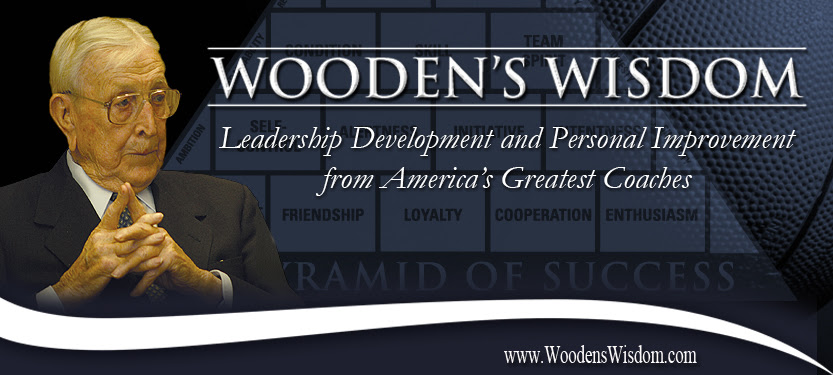As we hope the community enjoys visiting all our properties this week, we are pleased to present the following uplifting thoughts courtesy of the late great Coach Wooden, thoughts on leadership courtesy of Brian Dodd & The Daily Stoic :
 | |
ABILITY IS A POOR MAN'S WEALTH This favorite quote of Coach Wooden’s reflects his belief that it is not material possessions that are our greatest wealth. In his book My Personal Best, with Steve Jamison, Coach Wooden describes the home he grew up in as: A white farmhouse with a sparse living room and kitchen – a black potbelly stove in the former and a wood burning stove for cooking in the latter. There were two small bedrooms for the six of us; my brothers and I slept two to a bed. Near our old barn was a smokehouse for curing meat, and next to that, a well where we pumped our water by hand. Over to the side, all by itself, was the outhouse….We had no electricity, plumbing or conveniences. For my brothers and me, growing up on that little farm in Centerton was almost perfect. On this farm, John Wooden began to develop his greatest wealth: his own ability. We can either help or hinder those we love or supervise develop their own ability. Abraham Lincoln provided great advice in this regard with his admonition: "The worst thing you can do for those you love are the things they can and should do for themselves." When we do things for the people we love that they should be doing for themselves we prevent them from developing their own ability. The helicopter parent who soars in to the rescue every time their child makes a mistake or has a problem, is stopping the child from developing their own ability. World famous motivator and entrepreneur Zig Ziglar, whose father died when he was 5, was the 10th of 12 children and was selling peanuts on the street at 6 years old on the streets of Yazoo City, Mississippi, in the heart of the Depression. He had a favorite quote that motivated him: "God don’t make no junk." All of us have ability in some area. Find yours and develop it. There are only two requirements: you must like what you're doing and work hard at it. This wealth (your ability) is waiting for you. It is a wealth that no one can take away. Yours in Coaching, Craig Impelman Twitter: @woodenswisdom 4 Lessons from Michael Jordan and Kobe Bryant on the Importance of the Mastering the FundamentalsJun 03, 2024 09:21 pm | Brian Dodd The above quote by the incomparable Michael Jordan teaches us much about the importance of fundamentals and elite performance. First, leaders must learn the fundamentals. Fundamentals are the basics of any assignment which everyone must acquire skill in. Second, leaders then master those fundamentals. Learning the fundamentals is not enough, it is simply the beginning. […]
There’s a lot from the Stoics about the beauty and majesty of nature. Marcus Aurelius was clearly in awe of the natural world—both in matters big and small, from lions to stalks of grain. Seneca wrote a whole multi-volume series of books on nature, and spoke of the world as a temple to the gods. But it wasn’t rock formations or the vast expanse of the sea that awed the Stoics the most. What they were clearly most impressed by, what they worshiped the most was the awe-inspiring deeds of their ancestors and heroes. The way that Regulus—who we talked about recently—was willing to keep his word even though it meant marching back to his own death in Carthage. The effortlessness, as Marcus noted, with which his mother was so generous and decent. The way that Agrippinus defied Nero. The way Rutilius Rufus resisted corruption, and did not even complain when he was framed on false charges. The way Cato chose death over subservience to Caesar. How the first thing Marcus Aurelius did with absolute power…was share it with his stepbrother. It was these feats of courage and justice that the Stoics stood in awe of. And so should we—because even centuries later they still seem somehow unreal, nearly superhuman. The selflessness of it. The certainty of it. Where did it come from? How did they do it? It’s truly awesome. As we said earlier this month (and Right Thing, Right Now is all about), we have to study these examples, we have to try to answer those questions. We have to let these examples make us better. Because they are truly awe-inspiring. They are as impressive as any feat of nature or evolution, and yet because they were done by humans, we should understand that we are capable of such deeds too. The Stoic idea of human nature and living in accordance to it, as one Stoic scholar described it, “refers to the condition of a human who is expressing the very best in his or her development, that is their ultimate ‘best self.’ They are growing and changing in an effort to reach the ultimate goal for a human being.”
|
The Ladder of St. Augustine Saint Augustine! well hast thou said, |

No comments:
Post a Comment